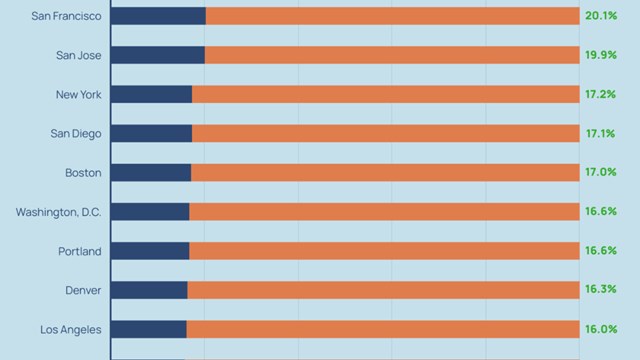Planning is the key to maintaining a balanced budget for co-op and condo associations. Knowing your budget, predicting expenses, even predicting the unpredictable are all vital components to having a sound bottom line and keeping your shared community financially healthy.
When unforeseen circumstances throw things off balance, a history of sound budget planning can help a well-prepared association regain its footing. For example, the September 11th attacks drove regional insurance rates sky high, leaving boards reeling as they tried to cover rate increases up to 100 or 150 percent or more of projected costs. "No matter how much we thought we were prepared, we could not have predicted that kind of increase," says Denise Fallon of Panther Valley Property Owners Association (POA) in Allamuchy.
On a smaller scale, events as seemingly negligible as snowstorms or ice storms can push a budget into the red. A huge storm means a community may need to pay for unexpected snow removal—in a large HOA or condo community, those costs could be significant. Situations such as ice damming can damage roofs and gutters, too, meaning additional unexpected repairs. "There are things that just can't be controlled," Fallon says.
Trim the Fat
If a budget is overburdened with ancillary expenses and extras to the detriment of real financial readiness, the first step, according to managing agent Chuck Graziano of Management Pros in Ramsey, is to assess the budget as a whole and determine where spending can be curbed with minimal impact on services. Both Graziano and Fallon suggest examining landscaping first. "Things like shrubbery and landscaping usually have the least impact on homeowners," Fallon says. "If you have to cut back on plantings, nobody's going to miss an extra bush or two."
"Landscaping is a big ticket item," Graziano agrees. "And when money is tight, it makes sense to examine the lawn service schedule—how much difference will it make to residents if the grass is cut twice a month versus once a week?" Many homeowners likely will choose longer grass over increased dues.
Graziano also suggests that insurance costs be reviewed. One way to take some of the sting out of those expenses is to increase the deductible. "Budget $5,000 for the deductible, then roll it over into next year's budget if it's not used," he says.
Snow removal, too, can offer savings. "When you've budgeted $25,000 for snow removal and you have a below-average year in terms of snowfall and end up only spending $15,000, you can put that other $10,000 in a contingency fund," Graziano says. That extra cash provides a cushion in case the following winter blankets the town in Arctic drifts of snow.
"Make sure you're paying appropriate attention to the estimates that snow-removal contractors are providing," Graziano continues. "Look at the breaks in pricing and make sure they're fair. It can be little things like the contractor saying it will cost $5,000 to clear a two- to four-inch storm, and "x" amount extra for calcium and sand. Typically, the first plowing includes putting down calcium and sand. You have to be very specific."
Doing some of the winter work in-house also can be a cost-saver, Fallon says. "We purchase our own salt and supplies in bulk for snow removal to save money. We have the salt piled in a place where it's not an environmental risk and then we don't have to spend on supplies during the year." Plus, buying bulk obviously is less expensive, she says.
Deferring certain maintenance projects is another area where creative project planning can save funds. Being ever mindful of governing rules, boards may want to examine when repairs are made and if staggering some of those repairs might make sense.
"For example," says Fallon, "entrance doors are important to our residents' safety - but we don't have to replace them all at once." With big-ticket items such as roof repair, sensible spending will help the bottom line. "If you have to replace a roof, you have to replace that roof," Fallon says. "But you can be proactive by buying 40-year shingles, which practically means a lifetime guarantee." In that instance, spending a little more to solve the initial problem pays off down the line.
Cutting Deeper
Sometimes, despite everyone's best efforts, an association's budget simply becomes bloated and inadequate. Maybe grounds care has eaten up dollars more quickly than planned, or maybe a capital improvement issue has arisen unexpectedly. Whatever the reason, it might be time to seriously cut back on the outward flow of cash.
Should that time come, it may be that reducing services is the only practical solution to fiscal shortcomings. If the pool is suffering from lack of use, or monthly socials just aren't drawing crowds, those are amenities that may need to be restructured. "We have more than 1,400 units," Fallon says. "If we have Teen Night and only five people show up, we'll let people know that low attendance might mean we have to eliminate the program." It may be worth a shot to try and bolster numbers, but if an event or program looks like it's flagging, it might be time to cut it all together.
Before undertaking a slash-and-burn approach however, it's important to remember that an association board has an obligation to uphold the community's governing documents. "There are certain items within the governing articles that must be taken care of—like things that relate to safety and maintenance," says Fallon.
Just as importantly, owners also expect to maintain their quality of life. Assessments—though never popular—may in fact be a better solution to budget shortfalls than sharp reductions in services and amenities.
Graziano agrees, and says that boards must adhere to those written rules. "It all depends on what the master deed says. We can't just fill the swimming pool in with dirt—as much as many boards might want to—if a pool is part of the services and amenities addressed."
Knowing Where Things Stand
While keeping the ground rules and governing documents in mind, it's important for boards and their management and auditing committees to review the HOA's budget on a regular basis. The boards that Fallon works with ask their committees to meet monthly to examine the association's budget and ensure that spending is on target.
Graziano agrees that regularly checking and double-checking the numbers is the only way to stay on track. "The managing agent should produce a draft of the budget for the board with detailed footnotes, outlining what it is that's being done," he says. "Then we can check and see if there are any revenue items we can increase or other items we can reduce. Is the golf course or pool earning enough to stay open? Are we renting the clubhouse for too little?" When reviewing budgets, Graziano says committees and boards should be looking to the long-term. "Associations [should] look at their capital reserves at least every three to five years—preferably three."
With the proper information at hand, the board and its financial committees and advisors can make prudent, timely decisions that can prevent potential revenue loss. Without the right numbers, the whole equation can become skewed.
Earning a Little Extra
Planning ahead and keeping informed of current spending can make all the difference in the world, but there's also the matter of where to keep an association's money and what to do with it when it's not being spent. Basil Kuzio, a financial advisor for American Express based in Voorhees, suggests that many boards could be better off financially if they explored more income-earning alternatives. "Many associations operate on inertia," he says. "They think that if this is the way past treasurers ran things, then that's how they should do it, too. Many times, they have not looked at ways to make their money work harder for them."
It is vital, Kuzio says, to determine when things like roof repairs need to be made. "Then put together a plan for building up your funds so that you'll have enough cash on hand in five years when you're ready to make the repairs. This way, you're not assessing your homeowners." Consulting a financial advisor may be key to boasting income, turning the one percent interest earned at a bank into a two percent rate with some slightly more aggressive CD products. "But the money must always be kept safe," Kuzio cautions.
Dealing with dollars can be a high-stakes job, but with proper planning and well-executed safety nets, keeping a budget in line and functioning properly is an attainable goal, if, as Graziano says, your board and management "just think long-term and look at the details."
Liz Lent is a freelance writer and a frequent contributor to The New Jersey Cooperator.







Leave a Comment